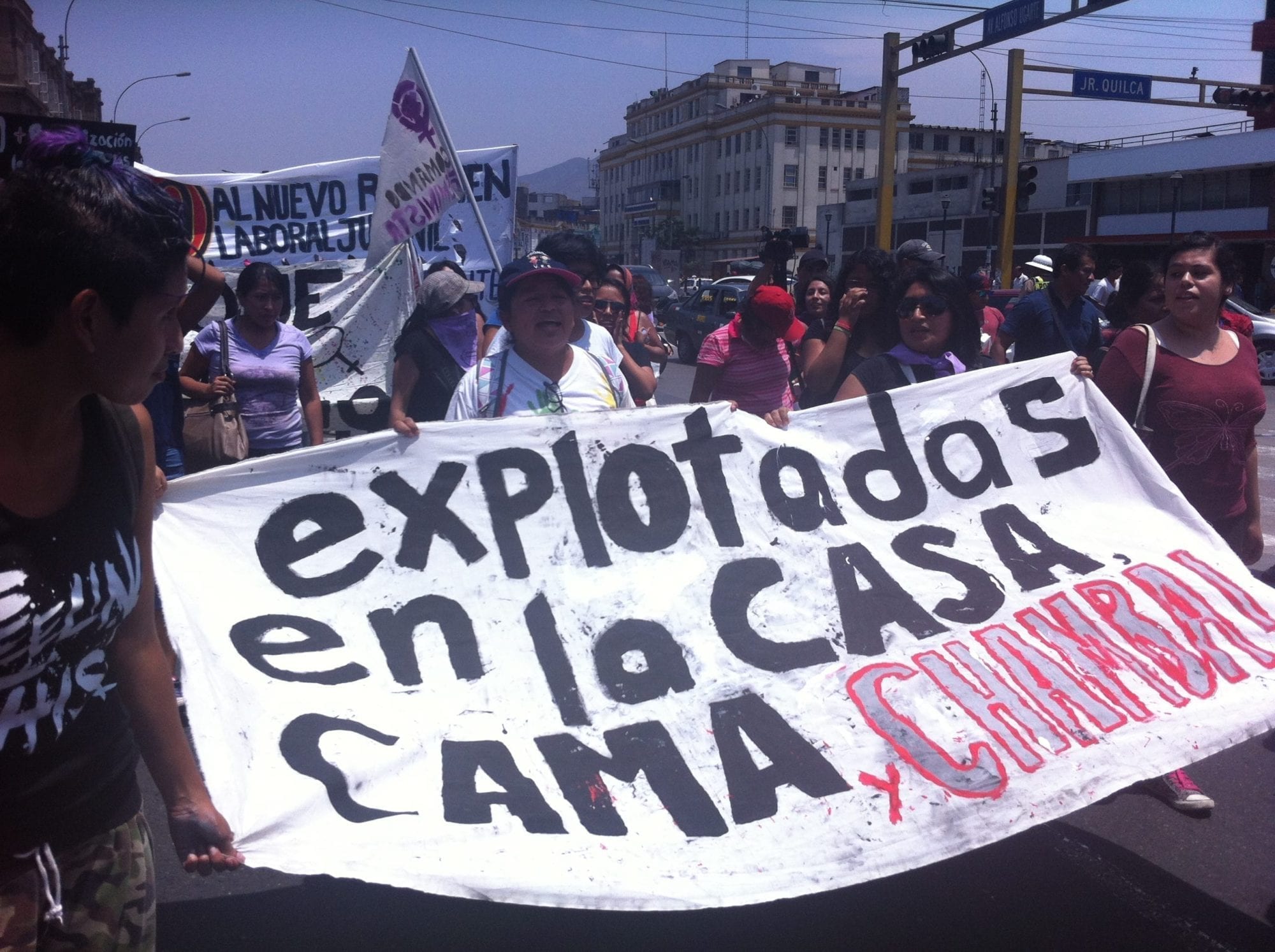
Jan 28, 2015
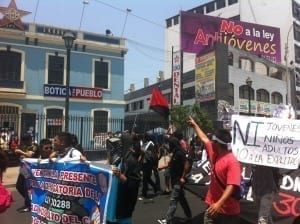
Credit: Solidarity Center/Luis Mendoza
Workers in Peru are celebrating the repeal this week of a labor law that targeted young workers, a huge victory that followed weeks of street demonstrations and protests by working people and their unions.
Peru’s Congress voted 114–91 to repeal the law, which reduced salaries and benefits for workers under age 25. A recent poll showed only one-fifth of Peruvians supported the law.
“They never asked young people what they thought,” says one worker, who took part in the protests.

The secretary general of the Topitop textile union featured on the cover of Peru’s La Republica as workers celebrated repeal of the labor law.
Ultimately, workers say, the law would not only have harmed young workers.
Jorge, an apparel worker at a Topitop factory that employs 2,400 workers, puts it this way: “What the company wants is to fire us and replace us with younger workers without any benefits.” Adds Abel, also a garment worker: “What we are doing is defending ourselves, our children and our future grandchildren.”
Young labor activists from the textile and apparel, export-oriented agriculture and mining sectors took vocal positions against the law and helped lead protests. The Solidarity Center, with support from the U.S. Department of Labor, works closely with young Peruvian worker activists to help them analyze their labor rights; develop leadership, negotiating and organizing skills; and learn to advocate for their issues.
As students, young workers and the Peruvian labor movement look toward upcoming campaigns to push for approval of a general labor law, an increase in the minimum wage and the repeal of another recent law that makes it easier for employers to conduct mass layoffs, the Solidarity Center plans to continue to work alongside union allies at the workplace, federation and confederation level to identify lessons learned from this experience and ensure that young workers can continue to provide leadership in union building and policy campaigns.
Apr 4, 2014
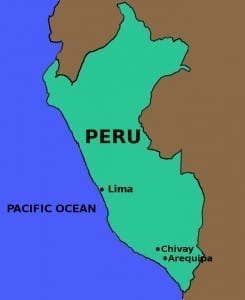 Thousands of Peruvians marched in Lima, the capital, yesterday in a strong show of support for an end to organized crime and related violence in Peru’s booming construction sector.
Thousands of Peruvians marched in Lima, the capital, yesterday in a strong show of support for an end to organized crime and related violence in Peru’s booming construction sector.
Unions and civil society leaders called for a systemic solution to the phenomenon of false “unions” that extort construction firms and turn building sites into battlefields across Peru. Violence related to worksite conflicts has resulted in the death of six construction worker union activists over the last three years and significant economic losses that affect construction projects, workers and their families.
Leaders of the march include the General Confederation of Workers of Peru (CGTP), the Construction Workers Federation, the Peruvian Human Rights Commission, the mayor of Lima, regional lawmakers and the Peruvian Chamber of Construction.
Mar 14, 2014
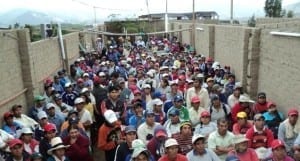
Camposol employees at a company assembly. Credit: Solidarity Center
Eighteen agricultural workers in Peru were detained during a work stoppage as they protested an agro-industrial company’s failure to uphold its collective bargaining agreement, according to the Camposol Workers’ Union (SITECASA). One union leader, Carmen Silvestre Rodríguez, was beaten by the national police, and the union’s general secretary, Felipé Arteaga, has been arrested, the union said.
SITECASA members began a peaceful work stoppage March 12 at the company’s facilities in Chao, a town in the country’s northern region. They are seeking the company’s compliance with several provisions in the region–wide collective bargaining agreement reached in July 2013, including resolution of daily production quotas for field workers, payment of annual profit sharing and provision of proper uniforms, footwear and meals for workers.
Field workers, who harvest avocados, mandarin oranges, mangoes and blueberries for export, currently must harvest 60 pallets before they receive their minimum daily wage of $11. According to the union, Camposol has conditioned its willingness to negotiate these points on the union’s retraction of an article in the collective bargaining agreement that provides employment stability (an indefinite contract) for workers with four years working for the company.
Camposol S.A. is Peru’s largest producer and exporter of non-traditional horticultural products like asparagus. Approximately 14,000 workers labor on Camposol’s vast plantations throughout the country. In 2012, the U.S. Department of State’s Human Rights Report cited Camposol for interfering with workers’ right to strike after the company failed to reinstate 250 workers dismissed for participating in a strike during collective bargaining.
Read the union’s full statement (Spanish).
Feb 14, 2014
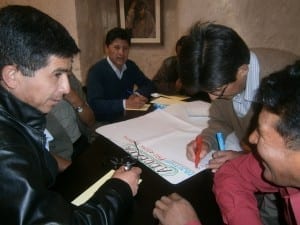
Textile workers at a meeting in Arequipa, where union leader López was fired after a successful contract campaign. Credit: Milko Sotomayor
José López Mota, former leader of a textile workers’ union local in Peru and current general secretary of the regional textile federation FERRETEX, was fired on February 10, 2014. He was dismissed after the union achieved a collective bargaining agreement in late 2013 for allegedly missing more than 15 days of work without permission. However, López was conducting union business during those days, using legally mandated union leave.
López led a highly visible campaign at the garment and yarn manufacturing factory where he worked, calling for management to negotiate a fair collective bargaining agreement. The union’s peaceful work stoppages that followed more than six months of labor-management negotiations were ultimately successful in gaining workers a collective bargaining agreement.
“They want a leader who does not speak up. I fought for union rights and alongside my brothers and sisters, we achieved two significant improvements in the two years that I was in charge,” López told Peruvian newspaper La República.
Last month, the union held elections in which López was replaced as general secretary. Although he continues to serve as the general secretary of the regional textile federation, he no longer is protected by “union immunity” (fuero sindical) extended to workplace union leaders.
The factory management says López took days off without permission. During that time, López used his protected right to take union leave to help conduct contract negotiations and attend labor conciliation meetings with company participation at the Arequipa regional labor directorate. But because he did not always ask for days off in writing, he has no paper trail to prove he was absent for legitimate union work.
“These methods (of repression) that were common practice in the past no longer generate the effect desired by employers who continue in this retrograde mentality,” said Geronimo López, Arequipa Region secretary-general of the Confederación General de Trabajadores del Perú (CGTP). The CGTP is one of Peru’s four main union federations. “On the contrary, to confront these anti-union actions, workers understand that they need to strengthen their unity and act with even greater commitment to defend their rights.”
Peruvian labor federations and international organizations are concerned about this violation of International Labor Organization (ILO) Conventions 87 and 98 (freedom of association and freedom to form a union and collectively bargain), and the intimidation tactics used to silence a labor rights defender in Arequipa’s booming textile and apparel sector.
Feb 1, 2014
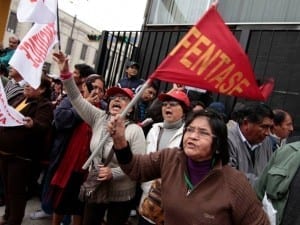
Public employees in Peru rally against a civil service law that takes away collective bargaining rights (above and below). Photos: Marcela Arellano Villa
Seeking to reach a collective bargaining agreement with the Peruvian government, three public-sector union confederations presented a joint petition to government officials in recent days. The bargaining proposal includes the freedom for workers to form unions, and stresses that worker rights should not be negated even though civil service is a “vocation and calling.”
Peruvian unions took inspiration from their brothers and sisters in Colombia, Argentina and Uruguay, who have negotiated similar industry-wide collective bargaining agreements.
The industry-wide bargaining proposal “is an opportunity to advance respect for freedom of association and collective bargaining in the public sector, which are currently under threat,” said Jorge Villa Garcia, deputy secretary general of the National Federation of Administrative Workers in the Education Sector (FENTASE). “It’s a chance for us to negotiate fair wages and establish agreements that will prevent conflict and help us build a better Peruvian civil service.” Villa Garcia is also Public Services International (PSI) coordinator for Peru
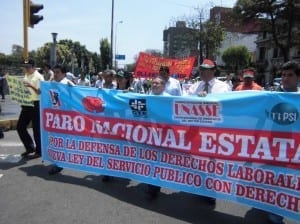 Last July, the government passed a new civil service law that eliminated the right of more than 500,000 public administration workers to collectively negotiate salaries, narrowed the definition of the type of unions they may establish and prevents “essential service” unions from striking (without defining essential services).
Last July, the government passed a new civil service law that eliminated the right of more than 500,000 public administration workers to collectively negotiate salaries, narrowed the definition of the type of unions they may establish and prevents “essential service” unions from striking (without defining essential services).
The International Labor Organization (ILO) has criticized the new law for its unfair restrictions on collective bargaining and the right to strike. Some members of the Peruvian Congress and human rights organizations have noted that portions of the law are contrary to international labor legislation and say it provides no mechanisms to promote the provision of quality public services. Three separate lawsuits charge the civil service law violates the constitution, and members of the Peruvian Congress have sponsored five bills to modify it.
Peru’s new civil service law is part of a “second generation” of neoliberal state reform that includes the country’s privatization of its health, education and other public services, actions that entail the elimination of many public-sector jobs, according to PSI. Public-sector worker rights are under attack in Latin America and elsewhere around the world, even as rising inequality and lack of jobs, especially for young workers, further limit the ability of working people to support themselves and their families.
The Solidarity Center actively assists public-sector workers in defending their rights across the Andean region, including in Peru, Ecuador and Colombia, and in coordination with PSI, the global union federation that represents public-sector workers worldwide.








